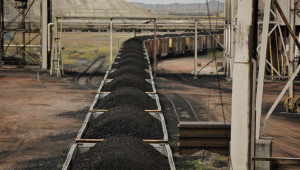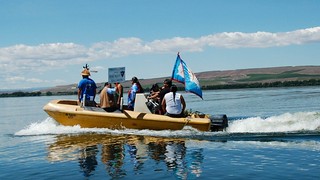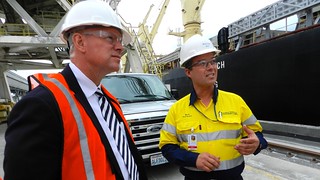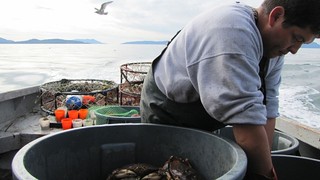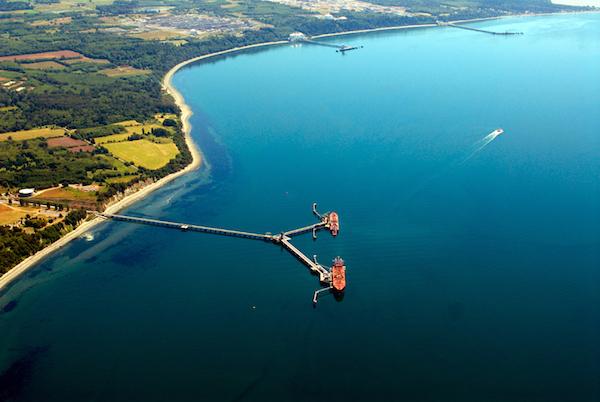
Pacific International Terminals proposes building an export terminal for the export of coal and other commodities, on Cherry Point near the Lummi Nation reservation. The site is approximately midway between the BP oil refinery — its docks are in the foreground — and the Alcoa Intalco Works aluminum smelter. Opponents fear the further industrialization of this area will harm an ecosystem that is struggling to survive.
Coal trains are not the only threats to sacred sites and traditional hunting and fishing territory.First Nations in the U.S. and Canada that share the Salish Sea contend that increased ballast water discharges associated with the Gateway Pacific Terminal would introduce invasive species to the local marine environment; that increased rail and vessel activity would increase the risk of coal and oil spills, and that coal dust from the railway and terminal would affect the health of marine waters and nearby communities. But the proposed Gateway Pacific Terminal is only one of the projects that would bring increased rail and shipping activity to the Salish Sea. Also proposed: Expansion of the Kinder Morgan pipeline to Vancouver, B.C., and expansion of a coal, grain and container terminal at Delta, B.C.
RELATED: Lummi Call Coal Terminals an Absolute No-Go, Invoking Treaty Rights
The Salish Sea is currently transited by an estimated 10,000 cargo ships and tankers en route to and from oil refineries and shipping ports. The George Washington University and Virginia Commonwealth University studied the potential risk for a large oil spill from increase in shipping and “an ever-changing vessel traffic mix” of cargo ships and tankers that would result from the three projects. The 2014 vessel traffic risk assessment was commissioned by the Puget Sound Partnership, a state agency charged with coordinating efforts to improve the health of Puget Sound by 2020.
“Even though this area has not experienced major oil spills in the past 20 years or so, the presence of tankers in an ever changing vessel traffic mix places the area at risk for large oil spills,” the study states. “While a previous GW/VCU analysis of this area demonstrated significant risk reduction of oil transportation risk due to existing risk mitigation measures, potential for large oil spills continues to be a prominent public concern heightened by proposed maritime terminal developments.”
Concerns about coal dust and coal spills are bolstered by recent incidents in other communities.
“On more than one occasion, coal dust from the Brayton Point [power-generating] station has covered the nearby neighborhoods of Somerset, Massachusetts,” the Center for Media and Democracyreports. “On October 29, 2008, coal dust covered nearby Ripley Street, where residents reported having coal dust in their homes despite the windows being closed.”
Oregon Public Broadcasting’s Ashley Ahearn reports that in 2009, a representative of BNSF Railway Company testified before a federal review board that 645 pounds of dust escapes from each coal train car during a 400-mile trip.
“Since the 2009 testimony, coal companies have been required to apply what’s called surfactant or topper agent to the trains before they leave the mines,” Ahearn reported in March 2013. “BNSF researchhas shown that the surfactants reduce the coal dust by about 85 percent. That should bring the 645-pound figure down to about 100 pounds of coal dust escaping per car. There are usually about 125 cars per coal train.”
But coal in transit can harm health and the environment in other ways. In December 2012, a ship crashed into a conveyor belt at Westshore Terminals in Vancouver, British Columbia, spilling 30 metric tons of coal into the sea. In January 2014, a 152-car coal train derailed in Burnaby, British Columbia; three cars spilled their loads, one of them into a protected waterway.
Concerns about rail accidents in Washington state are shared by rail workers themselves. Members of the Sheet Metal Air Rail and Transportation Workers (SMART), have proposed new rules for hazardous material trains in response to the recent explosions of oil trains in Canada and North Dakota. House Bill 1809 and Senate Bill 5679 would require trains carrying hazardous materials to have one or two additional staff on board. Previously, Washington state mandated six-person crews. Today, some trains operate with only one or two people, according to SMART.
“Our workers know how to run these trains safely, but the railroad refuses to provide adequate staffing, exposing the public and rail workers to death and injury,” said SMART legislative director Herb Krohn, a conductor and switchman on Washington’s rails, in announcing the bills.
The measures have bipartisan support. HB 1809 is sponsored by 34 representatives and has been approved by the House Committee on Labor. Companion bill SB 5679, sponsored by 24 senators, is before the Senate Committee on Commerce & Labor.
“Our bill simply restores Washington state’s common-sense safety standards,” Krohn said. “We looked at what went wrong in each of the catastrophic explosions and the close calls, and it’s clear that one or two people simply can’t monitor and safely operate these dangerous cargos. Adding even one more person to a train, particularly at the back of the train, will save lives.”
Read more at http://indiancountrytodaymedianetwork.com/2015/02/27/case-against-coal-terminals-lummi-cite-health-environmental-factors-159382


